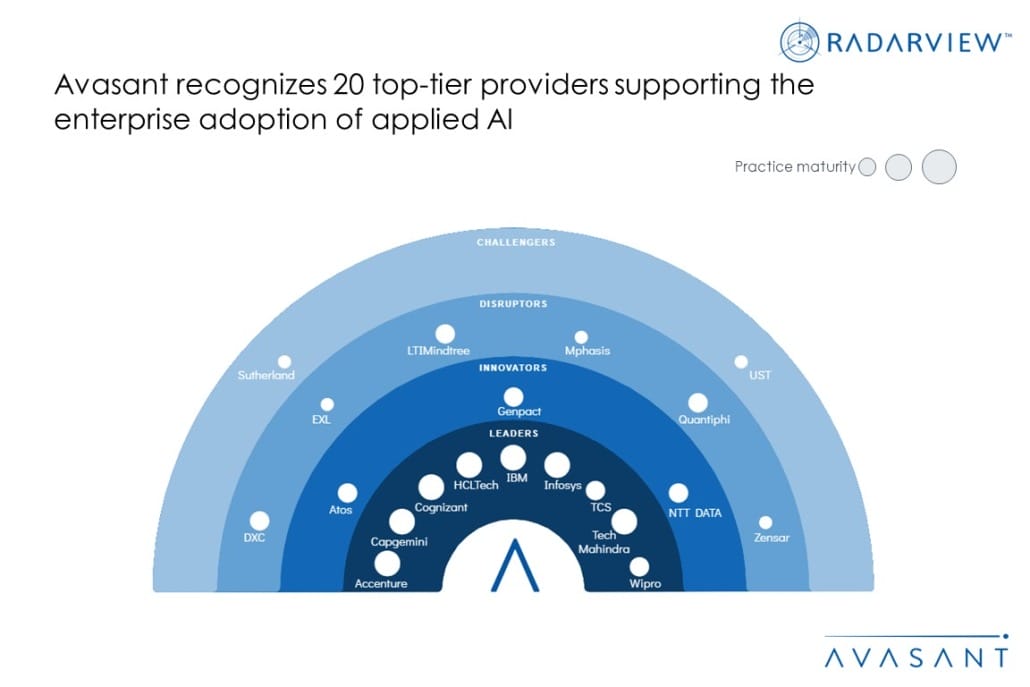With advancements in the current AI landscape, enterprises are increasing their investments in new technologies such as generative AI, computer vision, and edge AI. Businesses across industries have realized the tremendous optimization opportunities AI brings and how it aids them in improving operational efficiency while ensuring sustainability. In addition, increasing regulation and compliance around AI systems and data use is helping companies use AI systems more ethically.
Both demand- and supply-side trends are covered in Avasant’s Applied AI Services 2022–2023 RadarView™, respectively. These reports present a comprehensive study of applied AI service providers and closely examine the market leaders, innovators, disruptors, and challengers.
We evaluated 35 service providers across three dimensions: practice maturity, partner ecosystem, and investments and innovation. Of the 35 providers, we recognized 20 that brought the most value to the market during the past 12 months.
The report recognizes service providers in four categories:
-
- Leaders: Accenture, Capgemini, Cognizant, HCLTech, IBM, Infosys, TCS, Tech Mahindra, and Wipro
- Innovators: Atos, Genpact, and NTT DATA
- Disruptors: DXC, EXL, LTIMindtree, Mphasis, Quantiphi, and Zensar
- Challengers: Sutherland and UST
Figure 1 below from the full report illustrates these categories:

“As enterprises focus on generative AI, it is crucial to recognize that the technology remains in its nascent stages,” said Anupam Govil, Avasant partner and digital practice lead. “The promise of generative AI is immense; however, the road to its full realization is fraught with challenges, and businesses must remain vigilant in addressing them.”
The reports provide several findings, including the following:
-
- The share of AI projects in production soared to 70% as the post-pandemic demand surged. With advancements in generative AI, hardware and software powered by AI, and evolving frameworks in ethical AI, the momentum is set to continue in 2023. Over 60% of enterprises plan to increase AI investments in the coming year, recognizing its vital role in digital strategy, particularly cybersecurity, compliance, and forecasting and recommendation engine.
- Many generative AI models, such as Bard, ChatGPT, and ChatLLaMA, have emerged for enterprise use in the past six months. Businesses are adopting these for product and application development, marketing and advertising, decision support, content generation, and customer service.
- The advent of generative AI has spurred swift transformations within the AI domain, ushering in novel advancements. Key areas poised for evolution include the development of personalized digital avatars for immersive virtual interactions, multimodal input integration such as the incorporation of maps as data sources, aiding developers in code-writing and testing, and establishing sustainable, bespoke, and industry-specific large language models.
“Enterprises are recognizing the need to keep pace with the rapidly evolving AI landscape by converging technologies including edge computing, metaverse, and web 3.0 with generative AI,” said Abhisekh Satapathy, senior research analyst with Avasant. “This hyperconvergence drives enhanced virtual collaboration and highly personalized user experience.”
The Applied AI Services 2022–2023 RadarView™ report features detailed RadarView profiles of 20 service providers, along with their solutions, offerings, and experience in assisting enterprises in their applied AI journeys.
This Research Byte is a brief overview of the Applied AI Services 2022–2023 Market Insights™ and Applied AI Services 2022–2023 RadarView™ (click for pricing).


